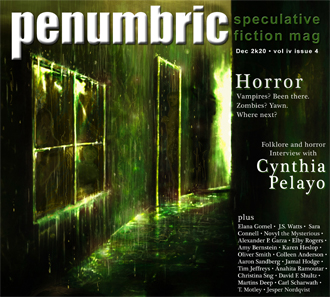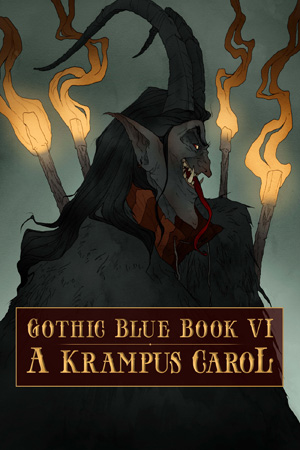
The cover of Gothic Blue Book VI: A Krampus Carol
Cynthia Pelayo writes and edits horror and true crime works, and not just a little--she has several books that have come out recently or are due out soon, including her upcoming novel
Children of Chicago. She also has her own small press, Burial Day Books, which puts out the Gothic Blue Book series. Everything she writes seems to be influenced in some way, large or small, by the spiritual, and by folklore and mythology. For this horror-themed
Penumbric, we were honored to be able to ask her about this, and about her influences, and about how she manages to keep up with, well, everything.
* * *
You've talked about your "need to believe" in the essay of the same title in the Southwest Review
. Is that need to believe in the spiritual what got you into writing horror, and studying folklore and mythology?
I guess yes and no. I was a writer in high school, but I was more of a journalist. I went to a really impoverished high school, I think it was like an 89% poverty rate, and I was a writer. I won our high school statewide awards. And then I had the idea of majoring in fiction, and my teachers all kind of steered me away from that. They're like, "You'll starve as a fiction writer. Go into journalism because then you can do PR, you can do marketing," which is what I kind of ended up doing for my day job anyway. So I did journalism, but I never worked as a full-time journalist. I did freelance journalism, or I wrote for community newspapers, and I covered a lot of hardcore or heavy topics, like homeless youth, police shootings. ... I feel like the last journalist story that I worked on--and I still do columns and features and things, but the last community news story I did--I was at my parents' house and we heard helicopters, which in Chicago is not unusual, but this was really close. I called my editor and I said, "Something's going on. I'm going to go check it out, maybe we can publish it." I showed up, and there was a kid. He must have been younger than me, he was a teenager, and he had bullet holes in his back, there were police standing around him ... it was like a scene from a movie. One side it's police, one side it's the community members, and each of them is arguing with the other over whose fault it was, and my Dad just started crying, because he recognized the kid from the neighborhood. And my Dad's like, the kid, he got out of jail, he was trying to get his life together, I knew him. And so just listening to my Dad's account that he knew this young man, and just to see my father crying over someone from the neighborhood like that, I just ... I couldn't write the story. I wanted to write about these things that I had seen and felt, but I couldn't put it into journalism. So I got an MFA in Writing, and that's how fiction started [for me]. So I was always a fiction writer, I was a journalist, and I think my fiction writing all comes from that place of pain of living in the city, and seeing these tragedies but seeing the beauty within the city as well.
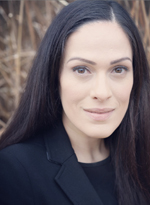
Cynthia Pelayo
I've used things like folklore and myth and spirituality almost as my own personal exploration to reckon with these bad things that happen, and I've seen so many bad things happen. I have friends from elementary school who are serving life in prison, well one friend who's serving life in prison for murder. I know people who were killed in gang shootings, ... like every story you hear in the news. "Young football star comes to the city" ... I know a kid like that, this young man, so handsome, left the city to play football, came back for the holidays and he was shot and killed. He was a teddy bear, handsome person, and it's awful, it's awful. And so ... fiction has been a way of trying to reckon with all this and hopefully find some meaning, and maybe it's been my own personal therapy, in a way, too.
Yeah, I've definitely written fiction like that, as almost a therapeutic thing, so ... yeah. I'm really interested in folklore and mythology as well. ... I've read several things where you've taken a fairy tale or story and written an alternate perspective version of it. Is there any particular influence or objective for doing that? I've really enjoyed them!
Thank you. I'm absolutely obsessed with fairy tales. My novel coming out, and I haven't mentioned too much what it's about, but I'll mention it here.
Children of Chicago is packed with fairy tales. It's where I take the Pied Piper fairy tale, and he is my boogeyman in the novel, and all throughout I feel like every chapter kind of plays with a fairy tale device ... I'm trying to be careful what I say, because there's a cool twist at the end ... but if you read the novel, you'll see that it's pretty heavily based in folklore, and what the Grimm Brothers were trying to do with all of the scary things ... A lot of the works of the Grimm Brothers, there was just tons of research in that book. ... The original [book], the first one, was an academic exploration, and they realized that they could repackage it to the masses, so the second edition is what we're most familiar with. The Grimms' fairy tales are really terrifying, some of them.
Oh, yeah. They're not Disney!
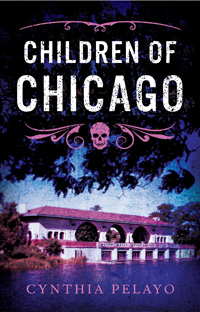
Children of Chicago by Cynthia Pelayo
In my MFA I feel like the main things I studied were the Grimm Brothers, Poe, Borges, and then I went on a really intense Beckett journey.
[laughs] I don't know why. I did a lot of theater, dramaturgy in my MFA, too, so I'm really fascinated with the commentary of what fairy tales were warning people about long ago that are very similar to things that we warn people about today, like little girls, be careful of the big bad wolf, be careful of the dangers that are out there. It's interesting that people were sharing those stories so long ago.
So when is that book due out?
February 9th.
Cool!
By Polis/Agora Books. And then I have another book out with them in 2022. It's not fairy tales, but it's something else that's really interesting. We're calling it the Chicago Fairy Tale Series. It's not a sequel, but they both have a lot of folklore and mythology embedded throughout.
I love researching my books, and I know some people hate books that have meaning, and hidden things in there, but that's how I write. I really like to embed meaning and heavy themes throughout. I don't want to beat my reader over the head, but there are a lot of things in my book that come up in particular that the average reader might not catch, but if you're familiar with Chicago history or fairy tales you'll kind of catch something and you'll be like, "She was just referencing Rumpelstiltskin in this!"
That's really cool! You're also involved in editing; you're an editor for Gothic Blue Book. I think you just said on Twitter that an edition of that is coming out ...
Yes. So Burial Day Books is an indie press that I started in 2011, and we released an anthology every year from 2011 to, like, 2016. We had some really cool writers that participated--Daniel Kraus, John Everson, Jay Bonansinga, who wrote The Walking Dead series. Max Booth III, who has a movie in post production right now. ... I closed Burial Day Books for a few years just to kind of manage family, and then I started it back up. It's funny, because we were closed for five years, and this year we're releasing three anthologies. And it's just my husband and I.
Wow.
We've had a lot of help from editors who've stepped in to help, and we have great illustrators. It's been a lot of work. Gothic Blue Book will be out hopefully on Halloween, the 31st, this Saturday
[this interview took place 29 Oct.--ed.]
Cool! Is it a physical print run?
Yes. It'll be in paperback and Kindle version, and they are typically little thin books, but this is our largest. Gothic blue books were abridgements of Gothic novels in the 1800s, so maybe they would take something like
The Monk, which is a period Gothic novel, and there could have been a Gothic blue book version of that, which would have been just an abridgement of it. They were cheap, kind of pulpy type magazines in the UK, and they didn't really last, because they were meant to be read and tossed. [They were] just a few shillings. "Shilling shockers" was a nickname for them. I just kind of took that quality, and that's where Gothic Blue Books pay homage to this whole Gothic feel of crumbling castles and family secrets. But this one's theme is Krampus, so we took all the mythology, and I told people to take the idea of Christmas lore and run with it. We got some really interesting stories. We are printing thirty-one stories, by thirty-one authors, so it's been a lot of work, but I'm really excited, it's a good collection, great authors participated.
That's awesome. Are you also one of the editors for We Are Wolves
?
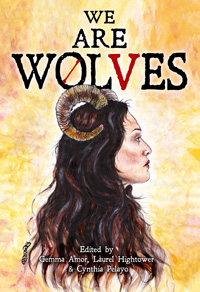
We Are Wolves, edited by Gemma Amor, Laurel Hightower, and Cynthia Pelayo
Yes. Gemma Amor and Laurel Hightower, they're really spearheading this project, so they coordinated with a ton of fantastic writers, and I am helping with--it is a charity anthology--so I am helping with packaging it as a cohesive collection. That will be out at the end of November. And then--this is great work, but I'm not sleeping!--and then V. Castro approached me to publish
Latinx Screams, which is a Latinx anthology that was supposed to be published by another publisher but that fell through, so I'm taking that collection and packaging it and we're going to publish that on Christmas. And then hopefully in January I can sleep.
Yeah! Do you have any advice for aspiring creators who want to have so much on their plate, like how to get through all that?
Get help at home. I mean, I am lucky because my spouse, he helps tremendously. That doesn't mean our house is not a mess--I'm looking at it now, and the house is a mess--but I think have a good plan. I'm really not a good ... I hate to say this, but ... I have so much going on, and I have a busy day job, but I can't write things down. I just have to keep things to mind, and I'm trying to write things down more. So try to find a process that works for you, because if you try to mimic someone else's process it might fall through, so play with different planners or ways of scheduling things ... have a lot of frozen food handy, because that kind of helps, too! You don't have to worry about making a meal if you have a busy night. So have a lot of snacks at the ready. It's not the best advice.
[smiles]
I like having lots of different projects. I have a novel that I wrapped up ... well, first the poetry collection that I wrapped up, and then the novel, and now I'm doing anthologies, and I'm also working on a middle grade novel, a kid's book. It's not in the best shape right now, but I'm aiming to have that ready to shop around in the next few months ...
Is that a horror novel as well?
It's a horror kid's book. My son asked me to write him a book, and I promised him I would write him a book, and now I'm faced with this challenge.
[laughs] He asks me like every other night, "Did you write that book yet?" So that one, hopefully it's a good story and people like it.
Cool! ... So, you've talked about your frustration with the expectation of publishers that you should only write works from your own cultural background, leading to some unfair limitations or expectations. ... Do you think some of this is getting better, that more publishers are more open to, I guess, more free expression?
I think of writers like Silvia Moreno-Garcia, [who] has been writing for a long time, where people are finally beginning to recognize her works--she's written fantasy and sci fi and horror; Stephen Graham Jones is another writer who's prolific, Native American, and he's written widely. ... I think that was my struggle for a while. I felt like I could only write Latin American themes, when I very first started writing fiction in 2008, and I feel like those stories are still important, and I'm still glad I wrote those stories. Quite a few of them are out of print and I'm trying to get them back in print. And it's funny because some people who have read my recent works, and they go back and they read my older works, and they're like, this doesn't sound like you today, and it doesn't. So I've been seeing the reviews of my current work and my older work ... and I don't think it's bad, I think I'm a very different writer today. But, I guess, two things. I think writers should have the flexibility to feel like they can grow, they can go in another direction. Because you might find the place where you're most happy--and I feel like I'm finally happy with what I'm writing and how I'm writing. And two, I think that it kinda just puts us in a box if we only write about our cultural background. There's a lot of mystery writers of color, and they'll write stories that aren't necessarily based in the States, they'll write stories that are based in Ireland, or other places.
So I think it's getting a little bit better. There's always going to be issues in publishing. I think people have to realize publishing is a business. You know, when you pitch a book to an agent, that agent then needs to take that book and pitch it to an editor at a publishing house, and then that editor has to pitch it in a marketing meeting: How is this going to sell? Who are we going to sell to? There's all of this icky business that creators don't want to think about, but it's how a lot of books are sold. And because I'm a researcher, I know that there is a really diverse population in the US, and globally too. Our books in the US are printed globally. I think that publishers are scared maybe to publish diverse voices because they don't think maybe they're going to sell, but there's definitely demand, there's a huge demand.
So is there a presumption on the part of publishers about how one should identify?
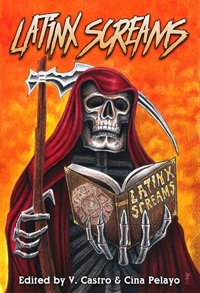
Latinx Screams, edited by V. Castro and Cynthia Pelayo
This one I've been thinking about a bit, because I know on the one hand writers of color want more representation of writers of color. It's only fair. We have x percentage of the population that is x or y, and we should see that representation of voices. But on the other hand there could be a segment of writers who feel like "I want to be published because I want my work to be recognized as good work." I feel like there's a few types of discussions going on, like do I identify with the term Latinx, do I identify as Mexican-American, or do I identify as California Native? I personally feel that people should do what makes them feel most comfortable. There is so much money in publishing and there is so much opportunity that I don't feel like anyone should have to feel like they're restricting themselves. The market's pretty vast. Even just look at digital media--YouTube and Amazon and Shudder--and there's just so many different ways that people consume entertainment that I feel like there's space for everyone and for everybody's voices. So I don't think people should feel limited or hesitant to present themselves as what they feel comfortable with.
So if you want to write things from a minority perspective, do so, and if not, do what you want, write about Ireland if you want.
Right, exactly. I feel like you should write the story that you want to tell, and I think that when people start writing something that gives them joy, that comes across. Even if it's a story about somebody's cultural background, and you know that going into it, like, wow, I feel the emotion and the passion and the commitment behind this story--so you can feel it when you're reading something and someone did it with joy. Sometimes you read something and this feels like they didn't really want to write this. Maybe they were writing for the market. So don't write for the market. Don't write what you think people want you to write. I did that, and I wasn't happy for a long time. Because I didn't know that I could write fairy tales, and people would like them, but I love writing about fairy tales, and I get sucked into German folklore and I was so excited, and I'm exploring some other cultural folklore right now, and it's fantastic and exciting, and we should have that opportunity to do so.
Yeah, definitely. So publishers are more open to this now?
I think so. I think they're more open to it. I still don't see ... Everyone says that representation's getting better. I still don't feel like it is getting better. We'll see like in the next year or two, because there's a lag of about two years [in publishing], so especially with the pandemic, there was a huge demand with publishers purchasing books. I know one agent who said that her June was the highest-selling June that they've ever had at her firm. So all of those books that she sold then to editors will likely get printed in about 2022; it takes about a year or two. So we'll see what 2022 looks like, if we start seeing a range of voices and different storylines. Hopefully it's not all pandemic related [laughs].
I feel like there's great ways of communicating the anxieties that we're feeling right now without basing it in modern times. So I'm seeing a lot of that type of work, with anxiety or issues with family dynamics because people are stuck at home with their families.
In the first issue back for Penumbric
in June we talked a lot about dystopia, and how it's almost difficult to write a dystopic novel right now because you're living in situations like the pandemic and funky political divisions and everything else. It's like how do you write that in a way that you're not just flat out reporting the news?
Yeah. Before I logged on here I saw an article that, I was just staring at the headline, it was just so out of a movie, the headline was that a big box store was pulling their firearms and ammunition off the store floors because of growing civil unrest.
Wow.
I mean, we recognize it's really bad, you know. I feel like sometimes I'm just kind of standing there, looking around the room, like we're all adults here, can we make some decisions, like this is ... I think, not to get political, but people are really angry, people are really scared, and when people are scared they can get angry, so I think that the next few weeks are going to be historic, you know, the response that we're going to see. I wish everyone safety, and I wish everyone well ...
So, horror as a genre tends to have trends; there were all the slasher films in the '70s and '80s, and zombies have been kinda the big thing since before The Walking Dead even. Do you think that the current political situation and, I guess, sort of dystopic things, is that sort of the next big wave?
I'm interested in seeing if we're going to see tribalism as a theme. I haven't seen it yet. But the whole "us against them," and what I haven't seen, which I really want to see, is an increase in paranoia and misinformation. We haven't seen that quite yet in fiction. You have people living today that could live in their own little pocket of reality and never really interact with anybody else in a different reality. I want to see that in fiction, because I feel like that ... I guess you could think of
1984 is a prime example of that,
Fahrenheit 451 ... so I'm curious if we're going to see those types of works.
Yeah, in a way it goes back to how difficult is it to write 1984
when the news every day, the headlines are like that.
I know what you mean. You have to take it where it's like not so much beating the reader over the head with what's happening now ...
What other writers do you enjoy reading personally?
I like a lot of classics, and I know people are probably going to roll their eyes when I say that, and I like writers that maybe people haven't heard about. But like I was saying, I read a lot of Borges, Salinger, Beckett. I like Agatha Christie ... not that [she] is a great writer, like her prose, but her plotting was always a lot of fun. But ... I think that my exploration of horror was always in the classics, like Poe. That's just what I had access to growing up and in my schools, I was always reading books that nobody else wanted to read, so Hemingway ... I always kind of go back to those books when I'm thinking about human emotion and dread, because even though some of these might not be horror, there's still a lot of dread within them.
In terms of new and current writers, I enjoy Daniel Kraus's work, Stephen Graham Jones, Paul Tremblay--
Survivor's Song, that was his most recent-- [and] Josh Malerman--his recent works like
Bird Box and
Malorie were fantastic. I also like things that aren't necessarily horror, like S.A. Cosby's
Blacktop Wasteland, Gabino Iglesias who kinda straddles genres. Oh, and Laurel Hightower's
Crossroads. That novel is horror. So I do read widely, and I try to get caught up as much as possible with what is current, especially in horror. Alma Katsu is another one. And I like her work, because she embeds a lot of history. And then poets, I read a lot of poetry, so like classic poetry, Emily Dickenson, who I'm obsessed with, but then current [poets] like Sara Tantlinger, Donna Lynch, and Linda Addison, Stephanie Wytovich. So I try to read widely.
I read a lot of nonfiction too. That helps my writing. I'm just research-obsessed. But I like classics. I like a lot of old-fashioned private detective novels that I find kind of fun. And Ray Bradbury ... I always go back when I'm having difficulty writing a story or just thinking through an idea, I'll just sit and read a Ray Bradbury short story, and just see how, mechanically, he's set up his tale, and that always seems to help me get back in the mode of things. His writing, I can't recommend it enough. If you're a new writer, go to Bradbury short stories. They're fantastic.
I agree! So, is there anything that I haven't asked that you'd like to talk about?
I think, just going back to the beginning, with folklore, legend, and myth ... I feel like I always come back to [those], and it's a reoccurring theme in my writing. I think in terms of my non-fiction work, my "Need to Believe" essay is probably, if anybody wants to know "why do you write what you write?," I think if you look at that essay, you can kind of have a line through my upbringing and my spiritual exploration to see why that carries over into my writing. My writing's always kind of the exploration of good and evil, what else is there? I like beauty in my horror, I'm not a gore horror writer. I like ... watching old Twilight Zone, and Hitchcock films, and just that dread and anxiety and atmosphere is what I always kind of chase.
Look for Cynthia Pelayo's Children of Chicago in stores and online from 9 February 2021. Gothic Blue Book VI is available now, as is We Are Wolves. (Click on the titles to have a look!) You can find more about her and her other projects at www.cinapelayo.com or on Twitter (@cinapelayo).







